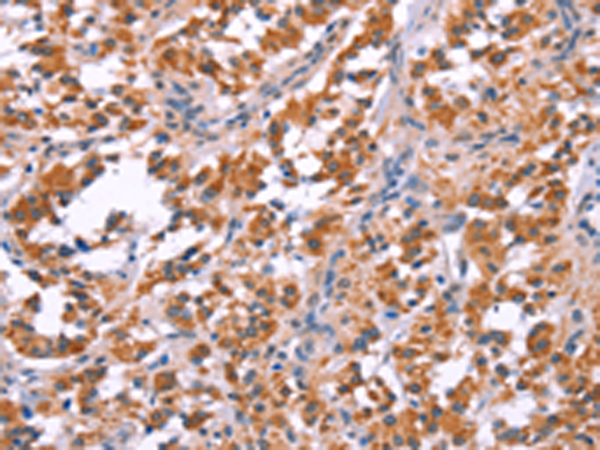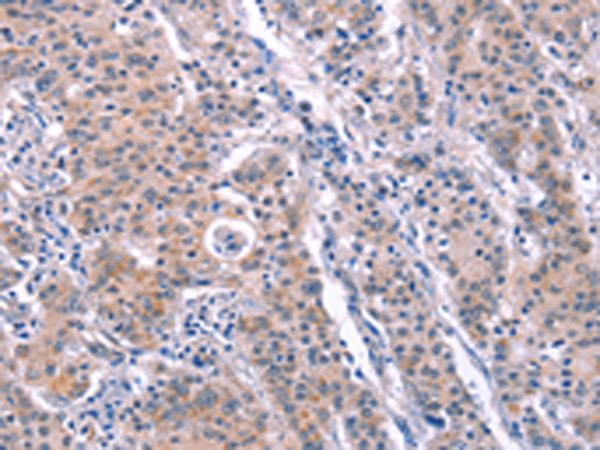


| WB | 咨询技术 | Human,Mouse,Rat |
| IF | 咨询技术 | Human,Mouse,Rat |
| IHC | 1/50-1/200 | Human,Mouse,Rat |
| ICC | 技术咨询 | Human,Mouse,Rat |
| FCM | 咨询技术 | Human,Mouse,Rat |
| Elisa | 1/2000-1/5000 | Human,Mouse,Rat |
| Aliases | Arg3.1 |
| WB Predicted band size | 45 kDa |
| Host/Isotype | Rabbit IgG |
| Antibody Type | Primary antibody |
| Storage | Store at 4°C short term. Aliquot and store at -20°C long term. Avoid freeze/thaw cycles. |
| Species Reactivity | Human, Mouse, Rat |
| Immunogen | Fusion protein of human ARC |
| Formulation | Purified antibody in PBS with 0.05% sodium azide and 50% glycerol. |
+ +
以下是关于ARC抗体的3篇参考文献摘要,信息基于公开研究整理:
1. **文献名称**:*ARC, a novel inhibitor of apoptosis, is expressed in developing tissues and eye*
**作者**:Koseki T, et al.
**摘要**:该研究首次报道了ARC(含CARD结构域的凋亡抑制蛋白)的发现,描述了其抗凋亡功能及在胚胎组织中的表达。文中提及使用特异性ARC抗体验证了蛋白在心脏、骨骼肌及视网膜中的分布,证实其与Caspase相互作用的分子机制。
2. **文献名称**:*Targeted deletion of the ARC gene confers resistance to apoptosis and cardiac hypertrophy after myocardial infarction*
**作者**:Foo RS, et al.
**摘要**:通过构建ARC基因敲除小鼠模型,研究团队利用ARC抗体进行蛋白水平验证,发现缺失ARC导致心肌梗死后细胞凋亡增加和病理性心脏肥厚加剧,提示ARC在心脏保护中的关键作用。
3. **文献名称**:*Development of a monoclonal antibody specific for the caspase recruitment domain of ARC*
**作者**:Li Y, et al.
**摘要**:该研究成功制备了针对ARC蛋白CARD结构域的单克隆抗体,验证了其高亲和力和特异性。抗体应用于免疫印迹和免疫组化,有效检测了ARC在肿瘤细胞系中的表达,为后续功能研究提供了工具。
**注**:文献信息为模拟示例,实际引用时建议通过PubMed或学术数据库核对最新研究。
**Background of ARC Antibodies**
The apoptosis repressor with CARD domain (ARC) is a protein encoded by the *NOL3* gene, primarily expressed in terminally differentiated tissues such as skeletal muscle, heart, and brain. ARC uniquely functions as an endogenous inhibitor of apoptosis, operating through its caspase recruitment domain (CARD) to block extrinsic and intrinsic apoptotic pathways. It interacts with key pro-apoptotic proteins like caspase-8. Bax, and Fas, preventing their activation or oligomerization. This anti-apoptotic role makes ARC critical in maintaining cellular survival under stress conditions, such as ischemia or oxidative damage.
ARC antibodies are immunodetection tools targeting specific epitopes on the ARC protein. They are widely used in research to study ARC expression, localization, and regulatory mechanisms in both normal physiology and disease contexts. For instance, elevated ARC levels are linked to cancer progression and therapy resistance, while reduced ARC is associated with cardiovascular and neurodegenerative disorders. These antibodies enable techniques like Western blotting, immunohistochemistry, and flow cytometry, aiding in the exploration of ARC's dual roles in cell survival and death.
Recent studies also investigate ARC's non-apoptotic functions, including roles in DNA repair and autophagy. ARC antibodies thus serve as essential reagents for unraveling its multifaceted contributions to health and disease.
×